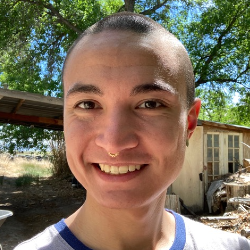Heritage
Dad was born in 1939.
I was born in 1996.
4 of my 7 siblings were born
before you, Ma. Did you visit
Pampanga as a kid?
That’s where your step-
children were raised.
3 wives, 57 years, & 7,000
miles away from your Talisay
home only makes sense
if I say colonialism, Ma.
Time & distance must be
products of your zeitgeist,
a suspension in post—
why did you & Dad
make me in America?
Ma, I can call you nanay
in 3 languages except my own.
I have no birthright.
My unborn body lost its roots
in 1957 after Dad graduated
from his segregated
high school—Falls Church,
Virginia—& the Air Force
assigned him to Clark AB.
Ma, his Oriental desire
was set, & I lost, years before
1991, when you were 24
& he took you to California.
I want to know him, & you,
but I only have numbers.
Tell me, Ma, how you survive
separated from your culture.
You say I’m lucky to live here,
but I think you’re wrong:
Luck is not being born at all.
American Pastoral
On a patch of infected soil,
the last alfalfa plant burns,
tells a story of lives never lived.
Humans haven’t touched this dirt.
Alfalfa burns under a dead sky,
nobody to witness the blaze.
Humans haven’t touched anything
in ages. Blister beetles die by firelight.
Nobody gazes upon blazed
dirt—once green, tales say.
Blister beetles continue to die,
fiery wind propels their memories:
Tales of green fields, they were called
farms. Alfalfa was grown to feed
horses, their bodies propelled by wind.
Like humans, the horses died,
along with the farms, now the alfalfa.
People’s greatest talent was poisoning
themselves, all the horses. What’s left
is fire, a patch of infected soil.

Dani Putney is a queer, non-binary, mixed-race Filipinx, & neurodivergent poet originally from Sacramento, California. Their debut full-length poetry collection is Salamat sa Intersectionality (Okay Donkey Press, May 2021). You can find Dani’s poetry in Camas, The Fourth River, LandLocked, & Tule Review, among other publications. Presently a PhD student at Oklahoma State University, they permanently reside in the middle of the Nevada desert.

